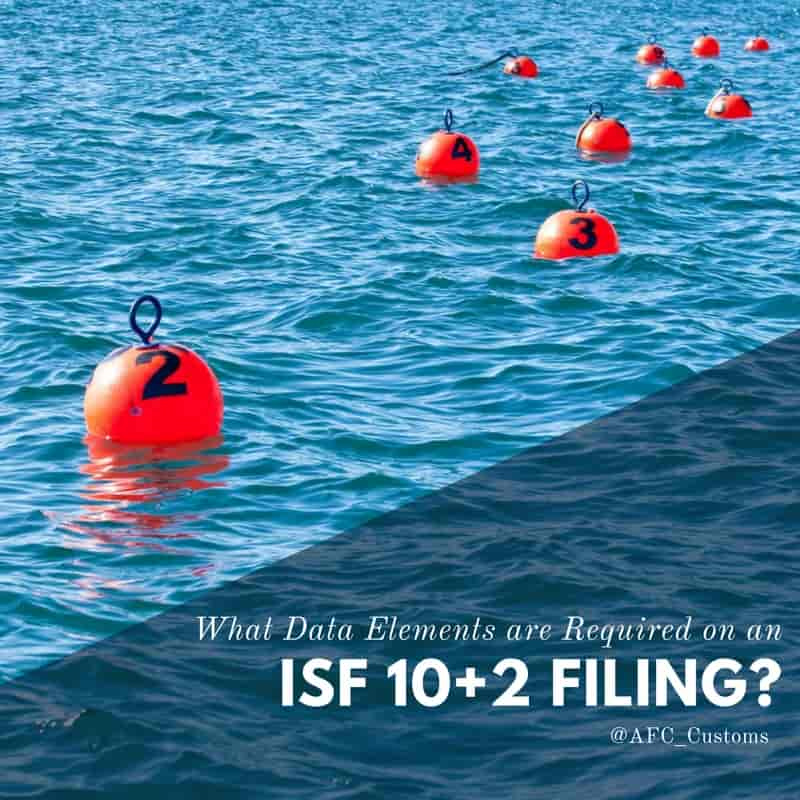The ISF filing requires importers or their agents and vessels to file data electronically with the U.S. Customs and Border Protection (CBP) for all in-bound ocean vessel import shipments. Short for Importer Security Filing, the ISF affects all ocean shipments entering the U.S. Read our cheat sheet to find out what data elements are required on ISF 10+2 filings.

Seller
You must include the name and address of the last known entity by whom the goods are sold or agreed to be sold. If the goods are to be imported otherwise than in pursuance of a purchase, the name and address of the owner of the goods must be provided. The seller information is usually available on the commercial invoice.
Buyer
You also need the name and address of the last known entity to whom the goods are sold or agreed to be sold. The buyer information is also generally available on the commercial invoice. If the goods are sold in transit and the buyer information changes, the ISF form must be amended.
Importer of Record number/FTZ Applicant ID number
The IRS number, EIN, Social Security number, or Customs assigned importer number is a must. These numbers are needed for the entity liable for payment of all duties and responsible for meeting all statutory and regulatory requirements incurred as a result of importation. For Foreign Trade Zone shipments, the IRS number of the party who files the documentation must be reported. If the importer of record on the entry is not the same as the importer that files the ISF, any ISF penalty would be against the party whose bond is posted for the ISF.
Consignee number
The IRS number, EIN, Social Security number, or Customs assigned imported number of the individual or firm in the U.S. on whose account the merchandise is shipped is needed as well.
Manufacturer (or supplier)
Include the name and address of the entity that last manufactured, assembled, produced, or grew the commodity. If you don’t have that information, include the name and address of the party supplying the finished goods in the country from which the goods are leaving. Remember that for textiles, the broker must have the actual manufacturer for entry purposes.
Ship to party

Do not forget the name and address of the first deliver-to party scheduled to physically receive the goods after the goods have been released from Customs custody. Customs believes this information will give predictability to targeting. If the ship to party is unknown, the facility where the goods will be unladen (e.g., pier) can be reported. If there are multiple delivery stop offs, only the first one is reported.
Country of origin
The country of manufacture, production, or growth of the article, based upon the import laws, rules and regulations of the U.S. is needed too. This is the same information declared on the Customs entry.
Harmonized Tariff Schedule Number
This is the tariff number under which the article is classified in the Harmonized Tariff Schedule (HTS). The final rule requires six digits but Customs will accept eight digits or the full 10-digit HTS number. All goods need to be pre-classified.
Container Stuffing Location
You need to add the name and address(es) of the physical location(s) where the imported goods were stuffed into the container. For break bulk shipments, the name and address(es) of the physical locations(s) where the goods were made “ship ready” must be provided. A “scheduled” stuffing location will be acceptable, but once the actual stuffing location is known, the ISF must be amended prior to arrival. The broker does not need to report which container was stuffed where. The container number is not required to be reported with the ISF.

Consolidator (stuffer)
Add the name and address of the party who stuffed the container or arranged for stuffing of the container. For break bulk shipments, the name and address of the party who made the goods “ship ready” or the party who arranged for the goods to be made “ship ready” must be provided.
Hire a Customs Broker
Working with a Licensed Customs Broker is the best way to make sure your documents are filed properly and ISF penalties are avoided. AFC International has experienced Licensed Customs Brokers that can file your ISF and Customs entries with U.S. Customs officials.


Leave a Reply
You must be logged in to post a comment.